Written by Kaylee Henderson (Kalamazoo College), Student Correspondent for CET Beijing, Fall 2019
One of the biggest adjustments I’ve had to make since coming to Beijing was adjusting to the academic life and expectations. On top of a 24/7 language pledge, we spend around six hours each day learning Chinese. The first day we arrived in Beijing, we took a placement test consisting of a two-hour-long written test and a short oral exam afterwards. At the end of our orientation week, I received my placement into the Pre-Advanced level of Chinese (300 level). Immediately after getting our placements we were introduced to our teachers and received our textbooks and homework for the next day. Immediately, I was slightly overwhelmed by how quickly we were jumping into everything, but I felt ready.
Every day, our classes start at 8:40. We start the day with our longest class, 大班课 (da ban ke), a lecture that covers our lesson for the day. We start each day with a 小考 (xiao kao), or a small quiz that tests our knowledge of the lesson’s vocabulary (that includes being able to write and recognize the characters, as well as recall their pinyin and English meaning). Then we go over a large number of vocabulary words and grammar structures, as well as review the meaning of the textbook reading.
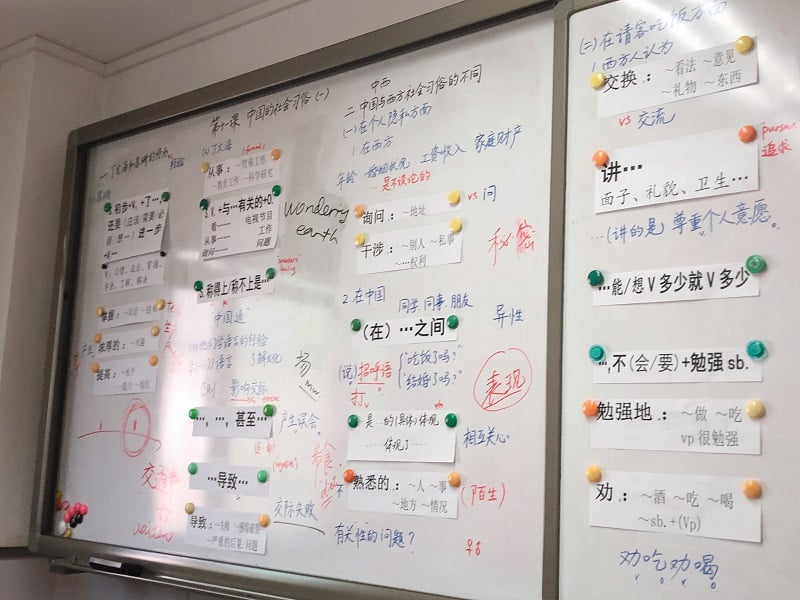
After a ten minute break, we immediately begin our next class called 小班课 (xiao ban ke), a class that’s meant to separate larger classes into smaller breakout sessions for more individualized instruction. However, since my class only consists of four people, we stay in the same group for this class. 小班课 is an hour-long class that usually focuses on developing our reading and/or listening skills. On a given day, we might watch a news report related to the topic we’re studying that week, then we might do a fill-in-the-blank transcript of the report and answer some comprehension questions followed by a discussion.
After 小班课 comes lunch, which we have an hour and a half for. Then at 1:00 P.M., 300 level and 400 level students will begin our 选修课 (xuan xiu ke), our elective class. Our elective class is Newspaper Chinese, where we each have a weekly presentation on a news article or an essay. After the student presentation, we will discuss our reading for the week, which is usually about marketing and business. For example, we’ve studied Costco, Amazon, and consumer patterns in China. I didn’t think I would ever learn this type of vocabulary in my time here, but it’s been really interesting!

After Newspaper Chinese, I have 一对一 (yi dui yi) twice a week, which is my one-on-one instruction with my teacher. In this class, we might do more review of our lesson for the day to practice speaking, as well as the new vocab and grammar, while other times we discuss the topic of my weekly oral exam/essay. On a normal Friday, every student will take a written test as well as a one-on-one oral exam. I like to prepare best for my oral exam by writing my essay first so that I can get as much feedback on it during my oral exam, then correcting it to be turned in the following Monday. At first, the weekly exams felt like a huge burden, but I’ve since gotten used to it.
Some weeks, we have what is called a Theme-Based Language Practicum week, with the purpose of getting the students out into the streets of Beijing to practice and learn. These weeks, we often have a field trip somewhere related to our topic that week. For example, when my class had our environmental protection and sustainability practicum week, we went to the Beijing Water Conservation Exhibition Center and had a personalized tour through the center. These weeks, we don’t have written tests and instead have longer PowerPoint presentations in front of the class. These weeks are always interesting because we get to see what topics each other has interest in and chose to dive deeper into.
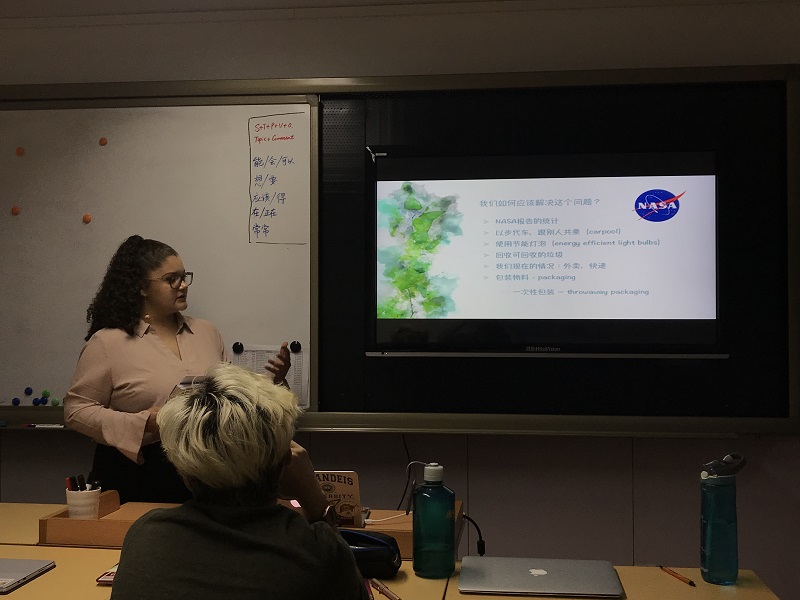
I’m sure you’re wondering about the homework, though. In a regular week, we study four lessons, one each day and a test on them on Friday. This means that each day we have one homework sheet reviewing that day’s lesson (复习作业 fuxi zuoye), testing your knowledge of the grammar and vocabulary. We also have a daily homework sheet to prepare for the following day’s lesson, called 预习作业 (yuxi zuoye). This involves first completing the textbook reading, then checking your understanding of the reading by answering a few reading comprehension questions. Nightly homework also includes learning the new vocab and grammar in preparation for the daily quiz.
Honestly, I felt pretty stressed by the amount of work in a day, a week. I hadn’t ever really had classes this difficult before, and the pressure of the language pledge and living in another country learning to navigate another culture made my burden seem even bigger. I was brought back to the first few weeks of my freshman year in college when I was hit by the weight of the reality that college was so different and difficult. I told my friends on my program that studying abroad felt like my freshman year orientation all over again; having the withstand the awkwardness of trying to make friends, accepting the reality that not everyone you met would be your best friend, and beginning to traverse a completely new environment. Thankfully, just like freshman orientation week, I was reassured that everyone was going through the same feelings as me: homesickness, nervousness, and the feeling of having not yet adapted. I had to adapt to the academic environment of my program just as much as I had to adapt to the physical and cultural environments of China.
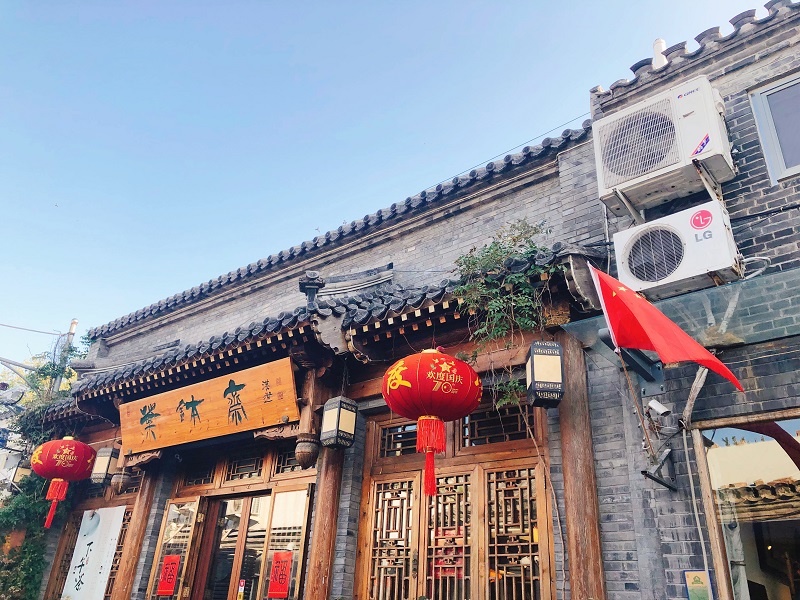

Some days I’m still overwhelmed by the amount of work I have, but it’s important to not forget ways that you decompress and de-stress. Sometimes those things don’t always work here, though, such as spending time with my cat, watching videos, and playing video games are some of my favorite ways to de-stress. However, my cat is still back at home, sometimes my internet won’t work well enough for me to stream a video or two, and I usually don’t have enough time to play games here. But I have since adopted a lot of new self-care strategies that are applicable here, like getting dinner or working on homework with friends and getting off campus to see the city.
Another large adjustment was the teaching style of my program. The reality is that not every teaching style or education system suits a student’s needs and personal learning style. I was surprised to find that this was a big problem for me, one that I hadn’t at all anticipated. In China, their education system emphasizes rote memorization (although we learned in my class that they’re beginning to move away from that and incorporate analysis and query). The structure of my classes also revolves around this age-old practice. I was also surprised too when my teachers asked me to stop taking notes in my class since this was an expectation that had been beaten into my head since middle school. Instead of becoming upset, I tried to understand why their system runs the ways it does and value it for what it is.
But one aspect of my classes that helps relieve my weekly stress with academics is field trips. One of the special components of the 300-level class is the field trips we take. Since coming here, we’ve visited the Beijing Water Conservation Exhibition Center, the Capital Museum, the China National Museum of Women and Children (my personal favorite), and we’ve also taken a special trip to a small senior living community in Beijing to interview elderly Chinese people. Being able to further my learning about our weekly topics outside of the classroom suits my learning style.
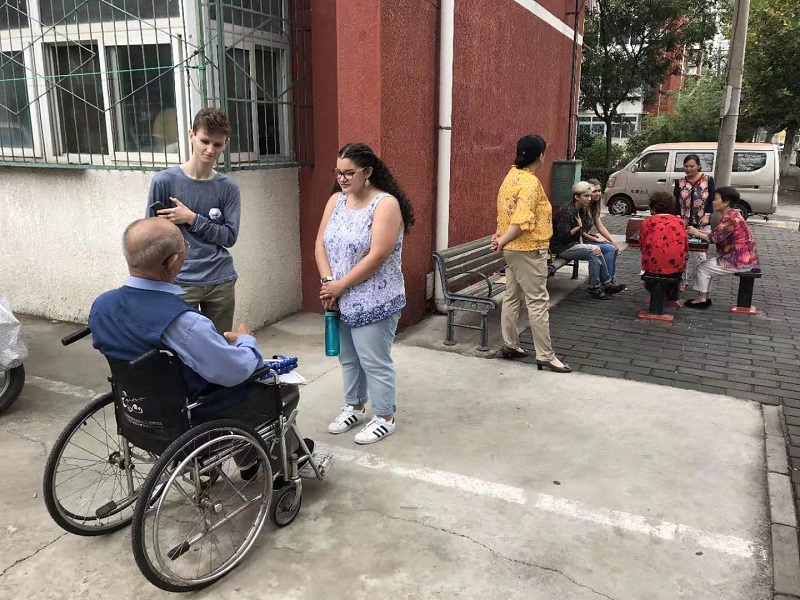
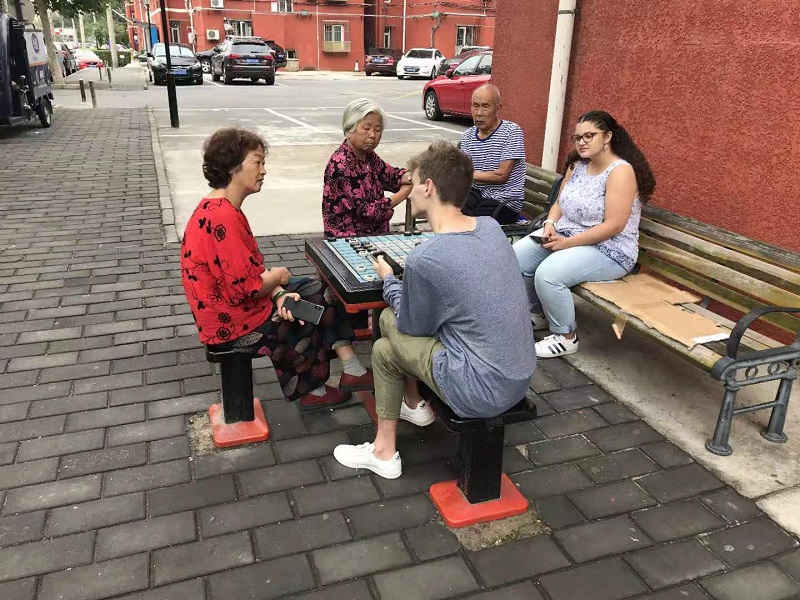
I will also be in Beijing for CET’s Janterm program, so I am looking forward to seeing how my academic life changes once I’m placed in a higher level of Chinese, as well as how the length of the program influences the structure of classes here. I am also interested in seeing how having learned in this environment will affect me once I’m back at my home university; will I bring back habits from here? Will my studying habits change? Will I be better at time management? I think only time will tell.
好的,我们下课休息吧!